Hannah Mills OBE, Gold medals and motivation.
Hannah Mills OBE is one of our Olympic Gold Medallists for Team GB. She won Silver at London 2012 and then Gold at Rio 2016 with her crewmate Saskia Clark MBE on their 470 sailing dinghy. She is now aiming to be the most successful female sailor in history and going for Gold once more at Tokyo 2020 with her new crewmate Eilidh McIntyre.
She was our keynote speaker at our Summer event focussed on ‘relaunch’ and in her case talking through how on earth she keeps the motivation up to relaunch herself into another 4-year Olympic cycle. She discusses many lessons that can easily be translatable into the business side of things and has officially joined our Launch Legends.
We have the audio version at the top of this page if you would like to watch her in person talking through her journey and lessons or her full transcription is below if you would prefer to read what she has to say.
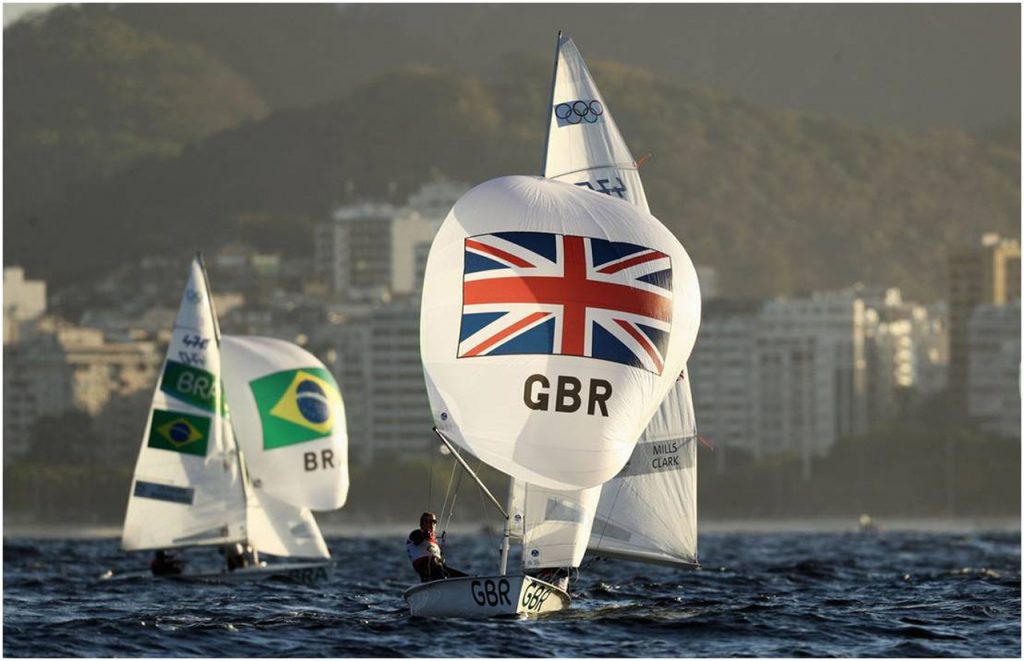 Hannah Mills OBE and Saskia Clarke MBE sailing on their 470 dinghy at Rio 2016
Hannah Mills OBE and Saskia Clarke MBE sailing on their 470 dinghy at Rio 2016A few simple ingredients.
Winning Olympic medals take a few key ingredients.
You need a reasonable amount of talent, a huge amount of self-awareness, heaps of determination and the ability to motivate yourself day in, day out no matter what.
Once you’ve won a gold medal it should be simple enough to do it again. You turn up with the same team, same type of boat, same huge stage, same preparation….just 1 thing is different. 4 years have gone by. And in those 4 years, everything else has changed.
Let's start from the beginning.
I want to take you back almost 10 years ago. I was a hugely motivated, desperately, excited 20 year old who would do almost anything to get to the Olympic Games and realise my dream of winning an Olympic Gold medal.
Motivation came to me in bucket loads. Even during some very hard years where my dream was all but gone due to the fact that I didn’t have a teammate. And without that in a 2 person boat, I wasn’t going to get very far! But it didn’t matter to me. I knew I had to be the best I could be, work hard, sail with anyone I could for training camps, competitions and perhaps blindly, reasoned that something would come along….and come along it did! Saskia Clark 8 years my senior, someone I had looked up to and idolised as being the perfect teammate split from her sailing partner 18 months out from London 2012 and I literally jumped at the opportunity.
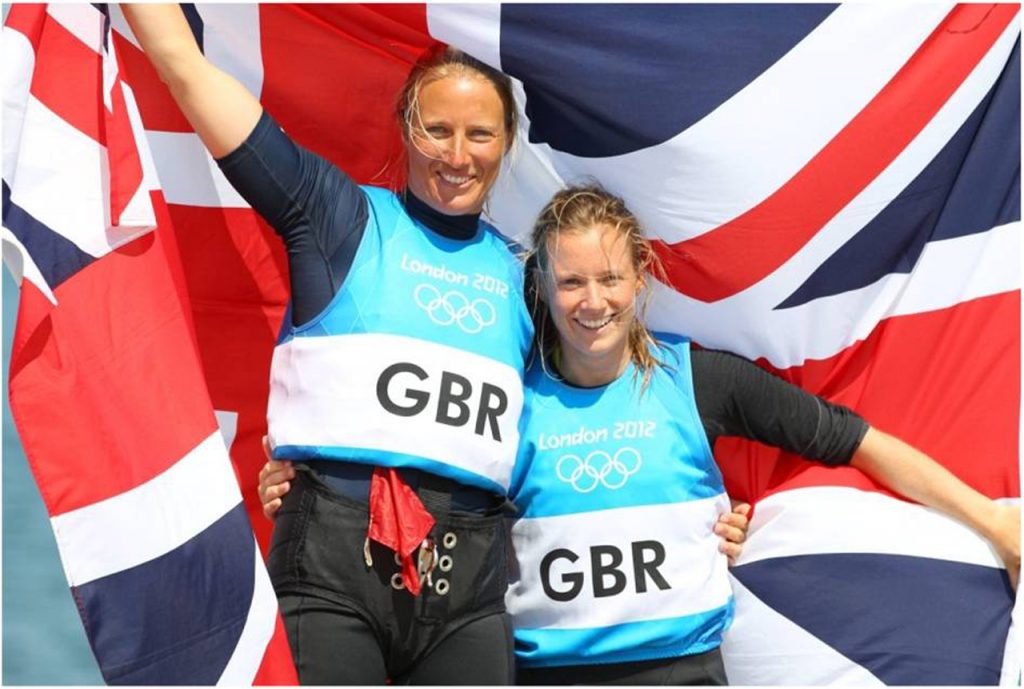 Hannah and Saskia at London 2012
Hannah and Saskia at London 2012We had a whirlwind 18 months, which absolutely flew by, from selection trials to getting selected for the London 2012 Olympics, to potentially getting de-selected from the London 2012 Olympics – that’s another story…to the preparation and the Games themselves. We barely had time to stop and take stock of things and I can honestly say won an Olympic silver medal through sheer determination and the ability to thrive in the bizarre bubble and stage that is the Olympic Games.
Hitting rockbottom.
Post London was potentially one of the lowest points in my life so far. We went from riding the highest high imaginable for 2 weeks to hitting the ground with an almighty bump. We hadn’t won gold and I was absolutely devastated. Broken, mentally drained and feeling like a failure, Sas and I took almost a year to decide whether we wanted to go through all that again. Whether we could face the disappointment if we didn’t succeed a second time? We had so many questions to answer and evaluate before we could even begin planning what our campaign would look like.
Ultimately, at this point, only gold would do for Rio 2016. What was successful about our London campaign and what wasn’t? Do we have what it takes to make the changes required? Can we stay ahead of the competition and overhaul the current gold medallists – the kiwi girls? But the biggest question of all – are we motivated to do it? because if not – there is simply no point in even trying. You could tick all the boxes in the world along the way, but if the motivation isn’t there, then you will stumble and ultimately fail.
My motivation in 2014 was at an all-time low. I just didn’t see the point in it all. I was questioning everything, life, the universe – you know the drill. I hated traveling and being away, constantly living out of a suitcase and struggling financially. The Olympics seemed miles off and there wasn’t even a guarantee we would get another medal, let alone win gold. I could be wasting a whole heap of time, money and energy on something – and for what? Why Why Why? Why would you do this?
Why?
‘Why’ became the biggest and most powerful question I would ever learn to answer.
Once I knew my own personal why – the reasons I was doing this, what I enjoyed about it, what I didn’t enjoy about it, my drivers in life and what I believed in as a person, it suddenly became about more than just winning a gold medal. It became about being able to achieve my own life values, goals and beliefs through what I was doing on my Olympic journey. I was able to realise what was important to me and what I was lacking at times of low motivation.
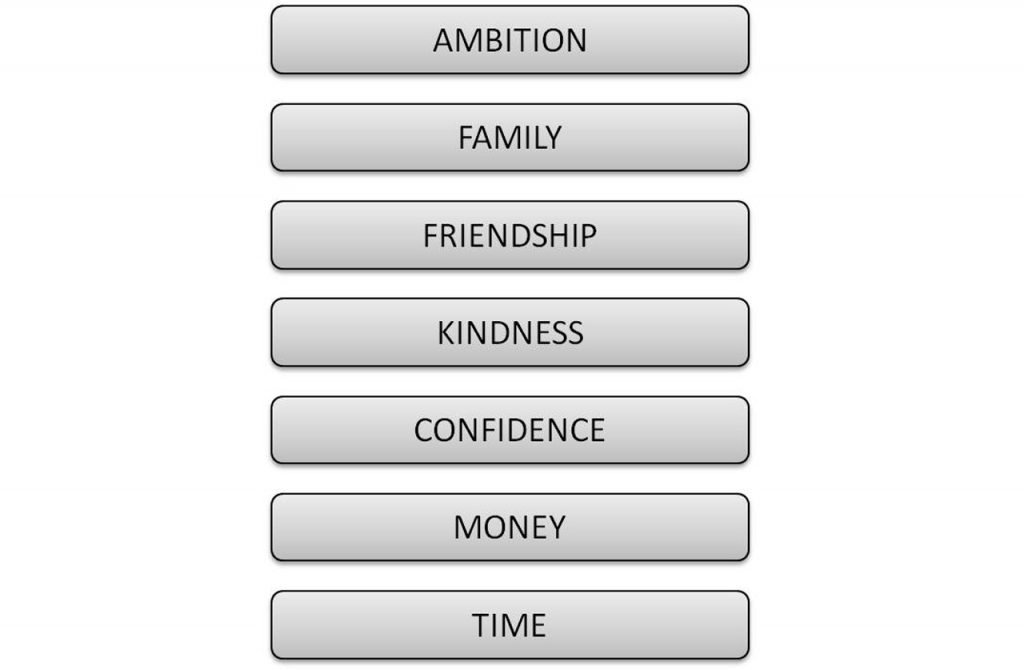 Hannah's list of personal values
Hannah's list of personal valuesThe slide up now is some of the work I did with our Team psychologist which lists my personal values – what is important to me as a person. If I am lacking any of these things for a sustained period of time, I will start to lose motivation and become disengaged.
Of course, there are times in life, where you just have to knuckle down and get on, but knowing what I needed to be happy was a huge turning point and gave me the skills to be able to get out of a rut, re-energise myself, lead my team and take control of my motivation.
Usually when I was exhausted and over it, fed up of the lifestyle and routine it would be Time. Time with friends and family, time for myself. If we were in a long training period without any competitions coming up or ways to mark ourselves against others, it would be the feeling of ambition and success that would be lacking. I would give myself small measurable goals each day which would alleviate the feeling of not achieving or to help generate small successes along the way.
Other motivational factors.
How else do I motivate myself in the moment? The best way I know how. When the fear of failure is overpowering before a big regatta and my natural reaction is to withdraw and tell myself it doesn’t really matter that much, it won’t be the end of the world if it goes badly, or when motivation to do a gym session just isn’t there! I visualise. I visualise what it will feel like to get to the end of the day, or week having not achieved what I set out to do. Having only given half of me to the task and left the other half somewhere inside. I had to do this in Rio. It may sound crazy…
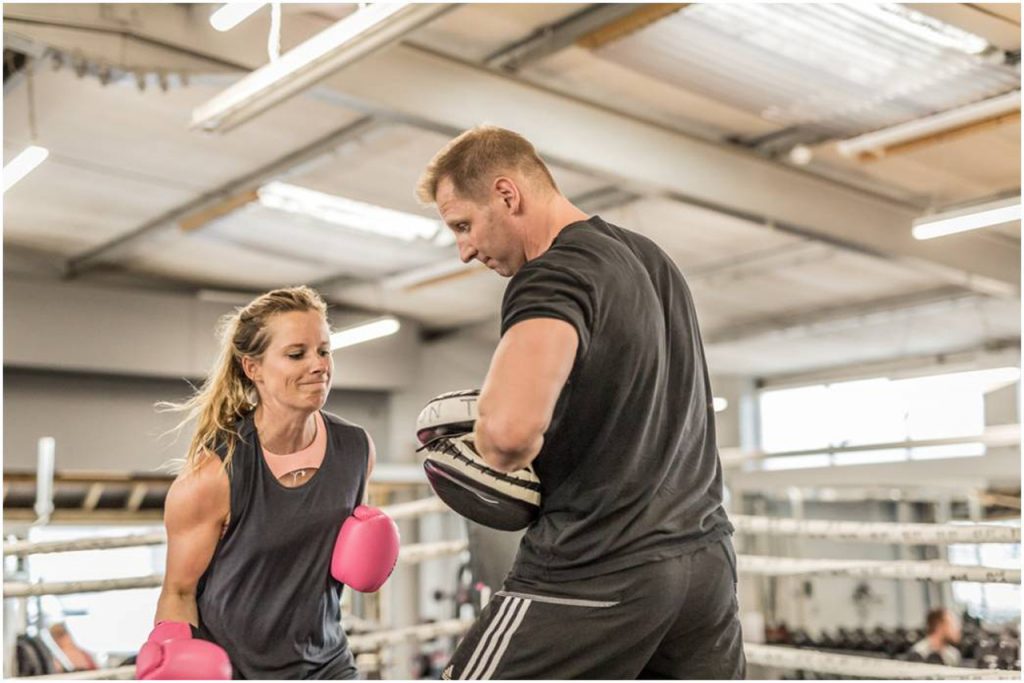 Hannah building up strength in the gym
Hannah building up strength in the gymRio 2016 journey begins.
So Rio 2016 – what did we do to get ahead and stay ahead? Saskia and I made some fundamental changes to our campaign for Rio. Yes, we improved our sailing skills, our technical set up of the boat and sails, we were fitter and stronger. But what I believe actually made the difference? It boils down to a few things:
Knowing, understanding and believing in our team. Saskia and myself, but also our coach Joe, our psychologists and physiologist. The people who facilitate and make it happen for us behind the scenes. We chose very carefully who we wanted involved in our campaign, why we wanted them and what we thought they would add. We then made absolutely sure they were brought in. They had to know the why, why we were doing it, what we wanted to achieve along the way, how they could add value where we saw the value in them.
 Rio de Janeiro
Rio de JaneiroCommunication.
We spent an awful lot of time in a room with a psychologist! There is a huge stigma in the UK and definitely within sport – although this is changing now – about psychology. It used to be perceived weak to use a psychologist and that you were a little mental if you needed one.
I had such a strong belief that if Saskia and I could communicate clearly and effectively with each other and with our team under a massive amount of pressure then it would give us a huge advantage over the rest of our competition. We could make clear, informed decisions around the race course, adapting to any situation that evolved on of off the water.
Accept and prioritise.
The ability to prioritise in an Olympic sailing campaign is probably the single most important skill there is. There are so many things you could do, so much you could spend energy on, going down pathways of technical discovery – trying to find a slightly faster sail shape, or slightly different boat shape which might add 1% speed difference but has taken up almost 80% of your time. There is never ever enough time to do everything you need to do, and I highly doubt anyone reaches the start line of the Olympics thinking they’ve done absolutely everything they needed to and wouldn’t want another day, week or month to modify a few things. If they do – they probably don’t have enough understanding of what’s required in the first place.
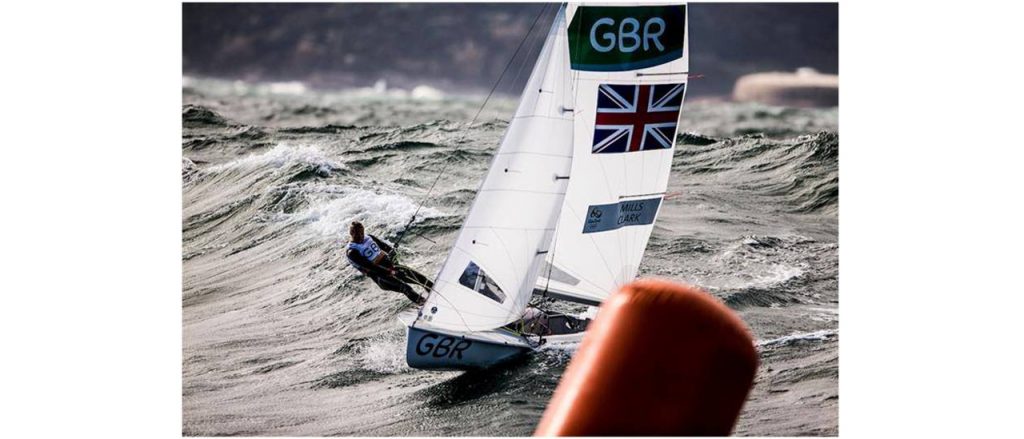 Hannah and Saskia racing their 470 at Rio 2016.
Hannah and Saskia racing their 470 at Rio 2016. Day 1 and feeling confident.
Saskia and I reached day 1 in Rio with a huge amount we hadn’t managed to get ticked off, but we had full confidence that in the time we had available, we had prioritised, strategised, reviewed and planned exceptionally well.
So imagine this – even having done all of this work, having had an incredible journey for the past 6 years with Saskia and Joe, wanting desperately to achieve a gold medal together, I could arrive at the day before our Olympic Games started in Rio feeling disengaged and withdrawn. My mind had tried to detach itself from the situation, I was in fight or flight mode and all I wanted to do was tell myself it didn’t matter that much and that it’s fine if we don’t achieve what we wanted to achieve. I know from past experiences though that this ultimately results in a poor, half-hearted performance. Luckily I had the skills to recognise this and the day before racing began, had to use the other most important motivational skill I had learnt. To visualise. Visualise what it would feel like if I got to the end of the week not having delivered my best performance, not having put everything on the line, and been unafraid of failure.
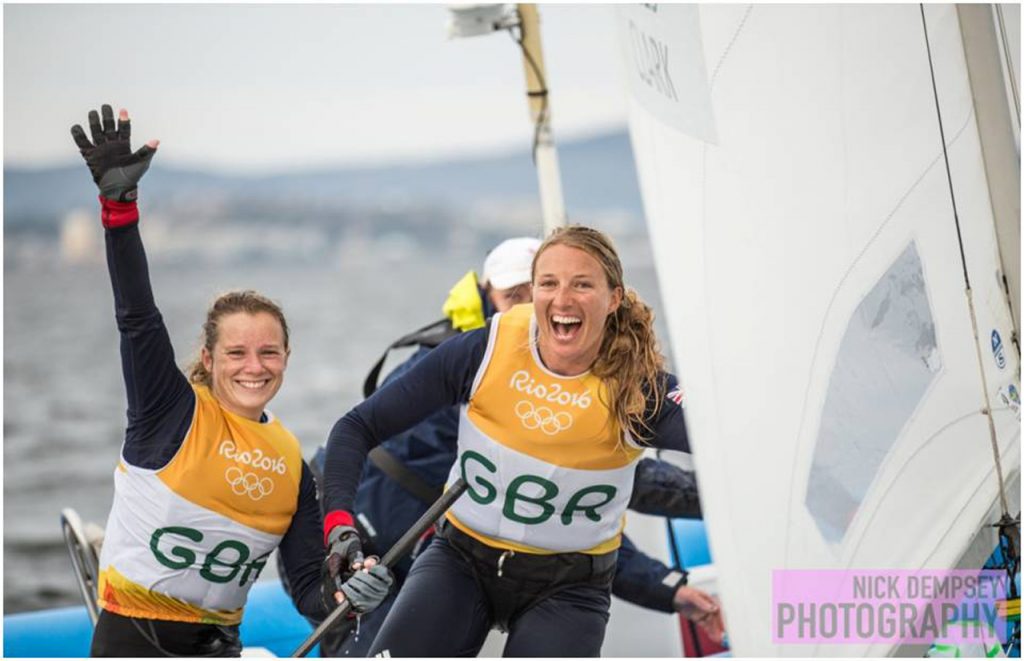 Celebrations on the finish line of the final race at Rio 2016.
Celebrations on the finish line of the final race at Rio 2016. Hannah Mills musts for staying motivated.
- Have the right team around you in the right positions to deliver their roles but also support you when needed
- What is your why?
- Know your values and what makes you happy
- Use others or your own past experiences – visualise what it will feel like if you only give 50% and the result at the end isn’t what you wanted.
Key tips for staying ahead of the game.
- Review review review – keep what was excellent and relevant, adjust and improve what was good and useful, discard or change what was average or poor.
- Never be arrogant or discard what has been done before, even if it was a failure
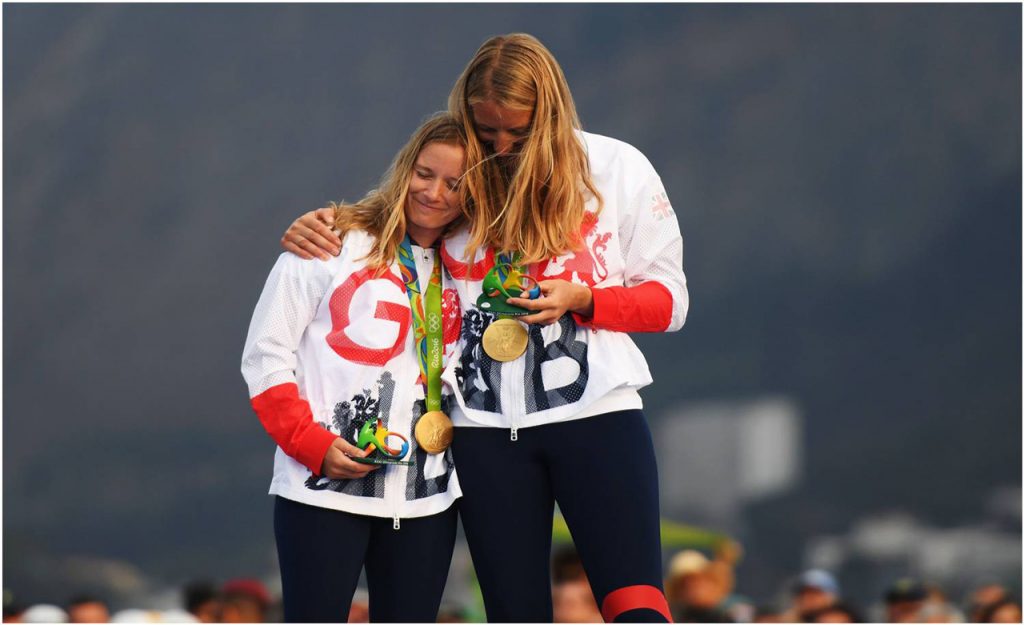 They did it! Gold at Rio 2016.
They did it! Gold at Rio 2016. 
By Hannah Mills OBE
Olympic Gold Medallist
